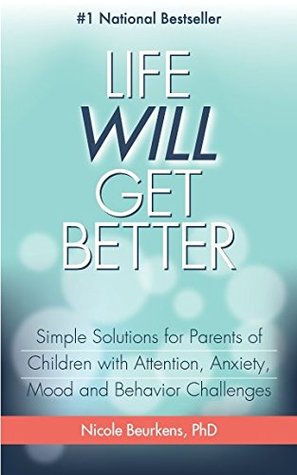Health is not all about Nutrition, Push-ups or attaching Lasers to your head. As I have mentioned previously, our relationships play a big part in our health and that is why I read books on parenting, relationships and emotionally coping with others.
A family member had this book, so I borrowed it to learn as much as I can.
The secondary title is: Simple Solutions for Parents of Children with Attention, Anxiety, Mood and Behavior Challenges.
While this book is geared towards parents and dealing with their kids, I would argue many of the tips are for the parents themselves and how to deal with other adults. It’s funny how sometimes we want our kids to act or behave a certain way, yet we don’t do it ourselves or we don’t practice what we preach with other adults. I am just as guilty.
There are five main sections of the book: Nutrition, Sleep, Movement, Connection and Cognition. These are all things that I work on with my Personal Coaching Clients.
I will provide the Key-Take Away(s) for each Section.
Nutrition
Reducing sugar intake is a sensible strategy to improve your child’s physical, cognitive and emotional health.
Artificial sweeteners have no benefit for physical or mental health, and have the potential to cause many problematic symptoms including inattention, hyperactivity, irritability, headaches, anxiety, and more.
Avoid feeding children foods and beverages with artificial dyes, preservatives and other chemicals, as they have been shown to worsen attention, mood and behavior symptoms.
Some children have specific food allergies and sensitivities that negatively impact their functioning. Identifying and removing these specific foods can lead to significant improvements in attention, anxiety, mood, and behavior.
Start the day with a high-quality protein-packed breakfast to support attention, mood, behavior, and learning throughout the morning at home and school.
Increasing fruit and vegetable intake helps ensure beneficial levels of essential vitamins, minerals and phytonutrients, and reduces the amount of less-healthy food consumed over the course of the day.
Drink more water! Increasing water consumption throughout the day can have a positive impact on mood, behavior, learning, and physical health.
Increasing Omega-3 fatty acid intake through foods and supplements supports improvements in mood, attention, behavior, and learning.
Specific nutritional supplements at the proper doses can be an important component of treating attention, anxiety, mood, and behavior challenges in children and young adults.
Moving children toward healthier eating habits is a process that happens over time. Small steps implemented consistently will help your child expand food preferences and eat more of the foods that support optimal health and function.
Sleep
The quantity and quality of your child’s sleep matter. Knowing how much sleep your child should be getting allows you to determine if your child is sleeping too little or too much.
Keep the routine leading up to bedtime consistent in order to provide the predictability and order a child’s brain needs to prepare for sleep.
Calming activities in the hours leading up to bedtime help children settle down for sleep more quickly and easily.
What your child eats and drinks before bed can make the difference between sleeping well and sleeping poorly. Provide a small sleep-supportive snack to help ensure a good night’s sleep for everyone in the family.
Reducing exposure to electronic devices -screen time -in the hour leading up to bedtime reduces the time needed to fall asleep, and improves sleep quality.
The physical environment can support or prevent quality sleep. Creating an optimal sleep environment for your child can be a simple solution to better sleep.
It is important for children to learn to fall asleep on their own at night. There is a systemic process for moving your child to greater independence with falling asleep, and the time and effort spent on it will save years of frustration and poor sleep.
Using specific supplements at the proper doses can help children fall asleep, stay asleep, and have good quality sleep at night, without the side effect risks of prescription medications.
Movement
Reducing the amount of time children spend on screen time activities supports improved mood, learning, social development, and behavior. Less time spent with electronic devices allows for increase time spent on movement activities, which benefits both physical and mental health.
Household chores can provide structural purposeful movement that promotes sensory integration, develops motor skills, enhances problem-solving skills, improves frustration tolerance, and encourages a healthy sense of personal competence.
Games involving physical activity are great for encouraging physical movement and building family relationships.
Obstacle courses are simple to create, can be used with children of all ages and developmental levels, and provide opportunities for structured movement indoors and outdoors.
Lycra fabric can provide movement benefits as well as a very calming sensory environment useful for reducing anxiety and improving emotional and behavioral regulation.
Unintegrated reflexes can be an underlying factor for many children with attention, anxiety, learning, and behavior challenges. Movement in general, and specific prescriptive movements used in reflex integration therapy, are essential to help children shift from struck unintegrated patterns of development into more mature patterns of functioning.
Implementing brief movement breaks at appropriate time intervals during sedentary activities supports your child’s attention, learning, mood, behavior, vision, and physical health.
Movement enhances learning, and children should be provided options to move in ways that facilitate focus and work completion at home and school.
Connection
The guided participation relationship between parents and children is essential for supporting child development across all domains in order for children to attain the highest degree of competence and independence possible.
A parent’s ability to stay calm when their child is distressed or angry is critical for managing the situation in a way that promotes calming, and builds a positive relationship between parent and child.
Reducing verbal communication, especially during moments when a child is stuck, frustrated, upset, or anxious, helps the child more effectively process language, reduce stress, and promotes a supportive relationship between parent and child.
Statements set a supportive tome for communication between parent and child, reduce impulsive responses, and encourage development of thoughtful communication and language processing skills.
Slowing down the pace of activities and communication can have a positive impact on a child’s ability to process information, stay calm and relaxed, and respond to task demands throughout the day. It also leads to a more positive supportive relationship between parent and child.
Situations that are overly complex can be frustrating and create a sense of incompetence for children and parents. Simplifying activities and expectations promotes a stronger parent-child relationship, lessens resistance on the part of the child, and leads to more successful engagement.
Intense emotional and behaviorally charged situations can arise between parents and children with attention, anxiety, mood, and behavior challenges. When this happens, the “stop the action” strategy supports the needs of the child, reduces the duration and intensity of the child’s reaction, and strengthens the connection between parent and child.
Zone of connection is the amount of space between parent and child that allows for continuous engagement and attention to one another. Establishing the appropriate zone of connection for children allows then to stay better engaged and attentive to people and activities.
A great way for parents to strengthen the relationship with their child, reduce anxiety, and promote positive communication and relational skills is to engage in periods of uninterrupted, non-demanding time together on a regular basis.
Cognition
Constant direct prompting, such as repeated verbal reminders or telling your child what to do can create prompt dependance. This reduces opportunities for children to grow in their ability t think and problem solve independently.
Children with rigid inflexible thinking and behavior have weak flexible thinking skills. Implementing a consistent process for helping them become more comfortable with change in routines and environment is necessary to reduce anxiety, and improve tolerance for change.
Understanding that mistakes are expected and manageable is essential for children to develop positive self-esteem and appropriate coping skills.
Children with attention, anxiety, mood, and behavior challenges tend to have low frustration tolerance that can lead to poor emotional and behavioral regulation. Using strategies to improve frustration tolerance allows children to persevere in the face of challenging or uncomfortable situations.
Providing your child with opportunities to solve problem throughout the day supports the development of problem solving skills and emotional resilience.
Teaching children to accurately identify the problem they encounter is essential to helping them feel a sense of control over their lives and circumstances, and to implement effective solutions.
Guiding children to generate and think through potential solutions is a critical part of helping them learn to manage and solve problems independently.
Problem solving journals are a simple way to teach children to anticipate problems they may encounter, as well as to reflect on past experiences in order to learn from them.
Activities that promote mindfulness help children slow down, improve awareness, attend to what is going on within and around them, and develop the ability to think before acting.
Spotlighting positive experiences, modeling our own positive outlook, and communicating is more positive ways can help children with chronically negative attitudes shift toward a more positive focus.
I believe many of these key takeaways are pretty obvious and easy to understand, even without reading the book. Some others you likely need the context of the book. If you want to be a better parent, especially if children or anyone in your life has challenges, I would recommend this book.
While I don’t work with children (excluding my own), I often have my clients ask me things relating to their kids. If you want to work with me to enhance your Nutrition, Sleep, Movement, Connection and Cognition, let’s have a conversation.




